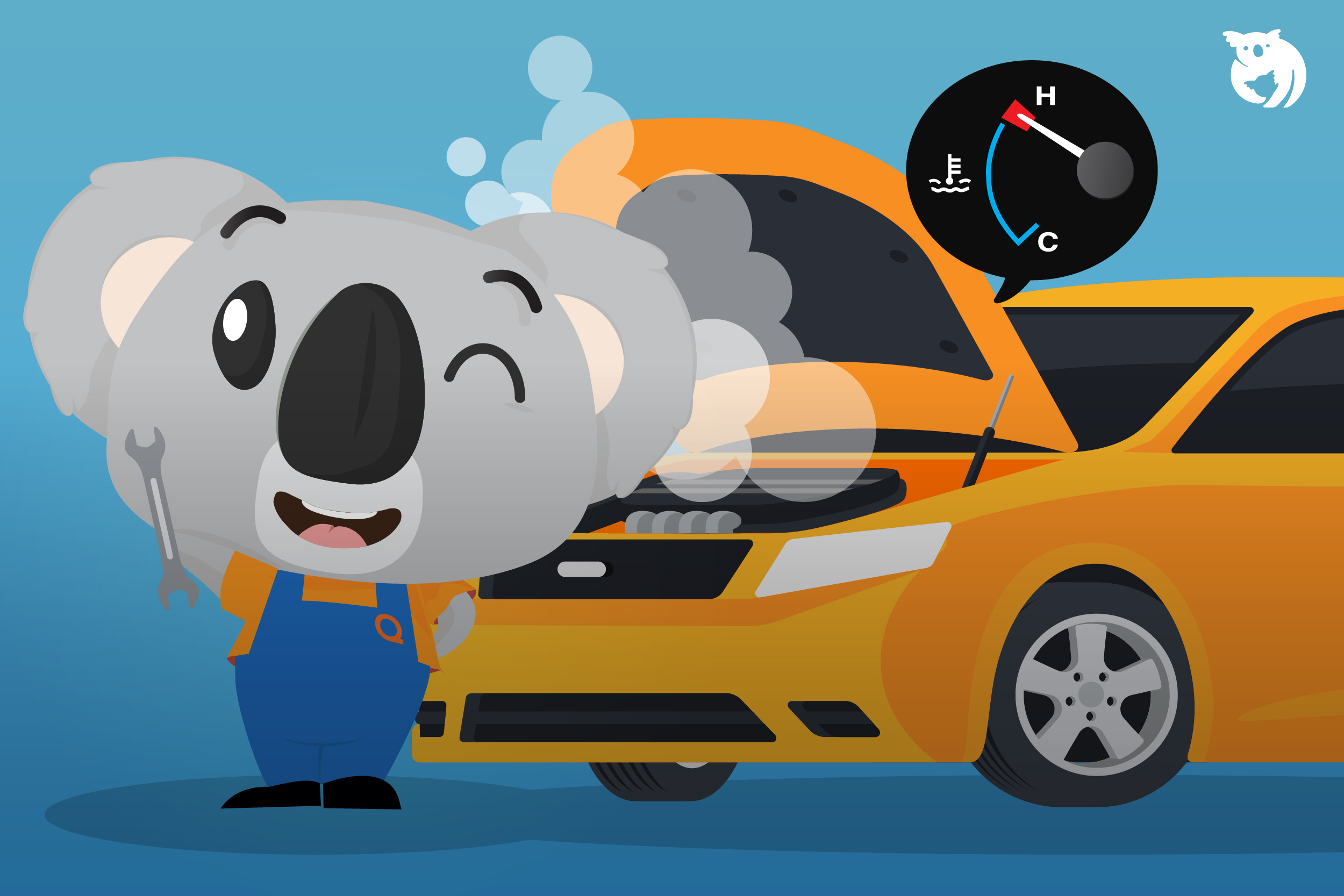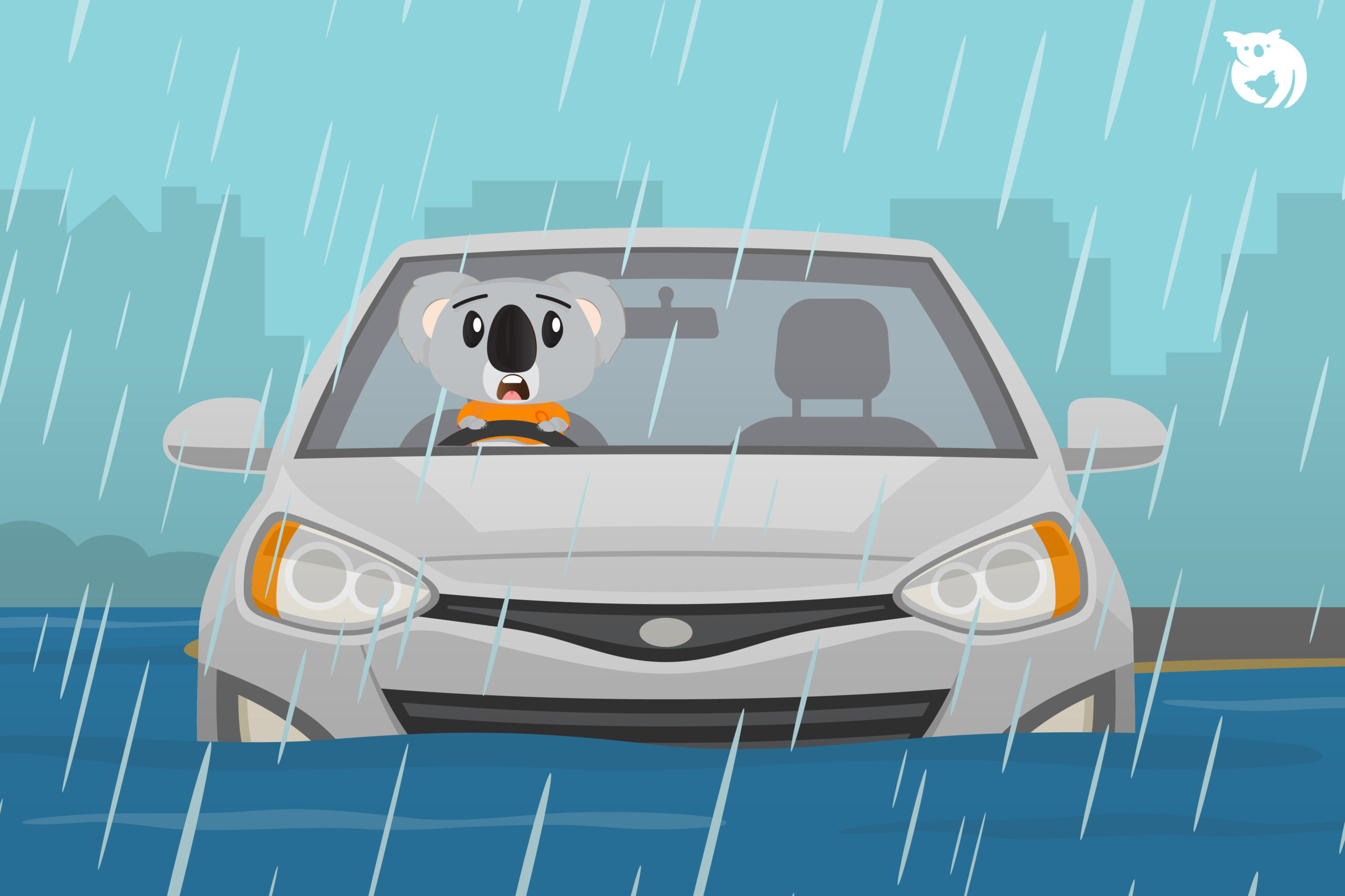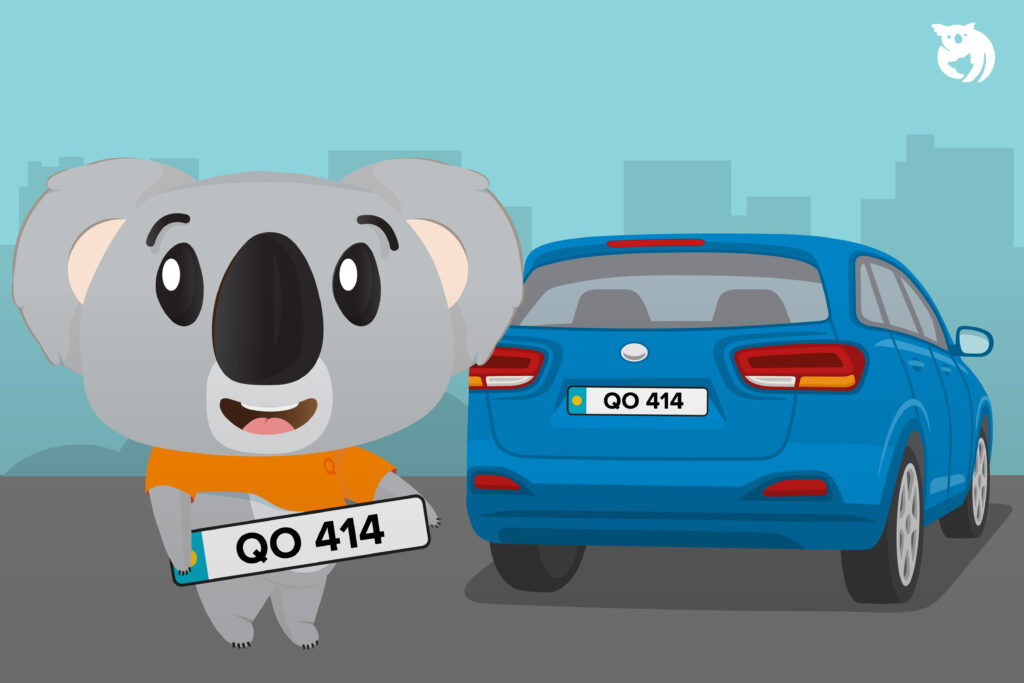Have you ever experienced your car temperature suddenly rising or your car engine overheating while driving? A hot engine can be a nightmare for all vehicle drivers, especially if it happens while driving alone at night.
Why does the car temperature rise? Basically, there are many causes of car temperature high – the car temperature can rise due to engine damage or issues with the car cooling system.
8 Causes of Car Temperature High, Engine Overheating
Why does the car temperature rise? What causes high car temperature or engine overheating? Essentially, the problem of high car temperature can occur due to several issues.
Usually, it is caused by damage to important components in the cooling system such as the car radiator, radiator fan, car thermostat, car water pump, dry air coolant, and so on.
1. Radiator Fan Not Spinning, Damaged
In general, the radiator fan functions to control the engine temperature and is driven by an electric motor. A faulty or non-spinning radiator fan can be a cause of temperature rise and can lead to the engine overheating. Any mechanical damage to this motor can affect the radiator fan’s function, preventing it from circulating sufficient cool air through the radiator.
Usually, your car faces engine overheating or car temperature high when idling or when driving in high traffic flow areas. Limited ambient airflow causes the car temperature to rise. However, the engine temperature returns to normal when your car is moving at a high speed because cool air from outside can now enter the engine compartment through the radiator fins.
Causes of a non-spinning or damaged radiator fan can be due to several factors such as:
- Damage to the fan motor – worn-out carbon brushes in the fan motor.
- Burnt, loose, or severed fuses.
- Issues with the wiring system of the radiator fan motor.
- Damage to the relay.
- Damage to the switches or car temperature sensor.
2. Engine Overheating Cause: Leaking Head Gasket
A leaking head gasket in a car causes gas from the cylinders to continuously enter the coolant channels when the engine is running. This indirectly increases the pressure in the coolant channels.
The high pressure in the coolant channels leads to the coolant being pushed into the overflow tank or reservoir. This reduces the amount of coolant in the coolant system and causes the car engine to overheat.
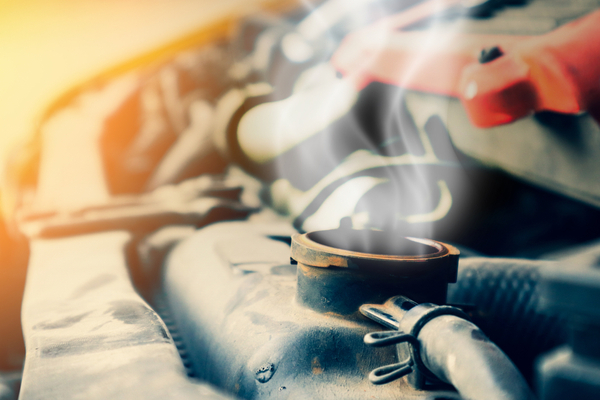
3. Air Bubbles in the Coolant
In addition, a car temperature high can occur due to the presence of air bubbles or air pockets in the coolant. Air bubble formation usually occurs due to gas leakage from the cylinders entering the coolant channels (caused by a leaking head gasket).
Apart from causing excessive pressure, trapped air bubbles in the coolant channels disrupt the engine cooling process. They also cause valve malfunctions and prevent the car thermostat from functioning properly.
Trapped air bubbles in the coolant channels usually occur after a coolant replacement or coolant system flushing is performed. It is recommended to perform an air bleeding or purging process after replacing the coolant to prevent car overheating situations.
4. Leaking Coolant, Dry Radiator
Most cars are equipped with a cooling system that helps maintain normal car temperature. A leaking, damaged, or clogged cooling system can disrupt its function of maintaining the engine temperature at a normal level and dissipating heat from the engine.
Usually, coolant leaks are caused by damage to the main cooling system components such as mechanical water pump leaks, radiator leaks, hoses, or water jacket core plugs.
However, if these components are in good condition but your car still experiences issues such as a dry radiator or a consistently low coolant reservoir, it is usually due to a head gasket leak. A faulty radiator cap spring can also cause radiator dryness and low coolant levels.
5. Malfunctioning or Damaged Water Pump
In addition to coolant, the water pump plays a role in the car’s cooling system. It circulates coolant throughout the engine. A faulty water pump can disrupt the coolant circulation and cause the engine temperature to rise.
Water pump damage is usually associated with a worn impeller or loose connection between the impeller and shaft.
Signs of a damaged water pump can be identified through high temperature readings on the temperature gauge, exceeding normal levels. Coolant leaks are also an indication of water pump damage.
6. Faulty Thermostat
Another common cause of a high car temperature is a faulty thermostat. If the car’s thermostat is damaged, it can cause the engine temperature to become excessively hot.
The function of a car thermostat is to regulate the amount of coolant flowing through the engine. If the thermostat is faulty and the valve opening is too small, it can cause restricted or disrupted coolant circulation.
Insufficient coolant flow can lead to the engine temperature not stabilizing at a normal level, gradually causing it to become too hot.
7. Clogged or Dirty Radiator
The car radiator is one of the crucial components in the engine. If the radiator is clogged or damaged, it can affect the circulation of the coolant. This is because the coolant cannot be efficiently transferred to the radiator to cool the engine.
Radiator clogging or damage usually occurs due to rust deposits in the radiator channels. Rust deposits can reduce efficiency and cause the car temperature to rise.
Additionally, foreign objects such as dry leaves, mud, or insects clogging the radiator fins can also cause the car engine to overheat. This is because these objects obstruct the flow of cool air from outside into the engine compartment through the radiator fins.
Therefore, it is important to ensure that the radiator fins are always in good condition to maintain radiator efficiency and performance.

8. Causes of High Car Temperature [BONUS]
A high car temperature issue should not be taken lightly. It needs to be addressed and maintained promptly to prevent more serious component damage.
i. Car Temperature Rises When Stopped
A common issue is a rise in car temperature when the vehicle is stationary. This situation is likely caused by a malfunctioning radiator fan. It is advisable to immediately check your car to prevent more serious damage.
ii. Car Temperature Rises When Air Conditioning is Turned On
Why does the car temperature rise when the air conditioning is turned on? Generally, there are several reasons why a car overheats when the air conditioning is on. It is usually due to a faulty thermostat, clogged radiator, or a malfunctioning radiator fan. It is recommended to consult a mechanic for a more accurate diagnosis.
iii. Car Temperature Rises, but Water Is Present
There are cases where the temperature rises but there is still water (coolant). This may be caused by a clogged channel that affects the flow of water to adequately cool the engine. Perform a thorough diagnosis to identify the root cause of the problem.
iv. Fluctuating Car Temperature
There can be several reasons for the fluctuating car temperature. It is recommended to conduct a complete diagnosis to identify the causes of the fluctuating car temperature.
v. Car Temperature Fluctuates at High Speeds
Usually, the car temperature rises when driving at high speeds due to a faulty thermostat, a clogged radiator, or radiator fan damage. You can consult your mechanic for more precise information.
vi. Car Temperature Rises When Climbing Hills
When climbing hills, the car engine generates more power to accommodate the increased load. This increased power demand indirectly causes the car engine to heat up.
However, this increased power demand is usually handled by a well-functioning engine cooling system. Unless there is damage to the cooling system such as a water pump, radiator, or thermostat.
Car Temperature Rises: Signs of High Car Temperature
Usually, a hot engine does not directly cause the car’s temperature to rise. However, it indicates that the engine components or your car’s cooling system are not in good condition. Therefore, it is important for you to identify the causes of car overheating or signs of car overheating, such as:
- Smoke emanating from the car hood (white steam or smoke coming from the front hood of the car);
- The engine temperature gauge on the car’s dashboard increases or reaches “H” or enters the red zone;
- For some car models, the engine temperature warning light illuminates – refer to the car manual for confirmation;
- Unusual or burnt smells coming from the engine area – a leaking coolant usually has a sweet smell, while engine oil leaks usually have a burnt or charred smell.
Car Temperature Rises: What to Do When Your Car Overheats?
What should you do when your car’s temperature rises or when it overheats? If you find yourself stuck in traffic and notice smoke or white steam coming from the front hood of your car – stay calm. If the car temperature high, you can take precautionary steps as follows:
1. Stay Calm
If you encounter a situation where the car’s temperature meter rises, stay calm and do not panic. Some drivers may abruptly press the car brake when they notice smoke coming from the car hood.
Such actions are highly dangerous and can increase the risk of more serious accidents.
2. Turn Off the Car Air Conditioning and Other Electronics
Immediately turn off the car air conditioning and other electronic devices such as the radio to reduce the pressure on the engine. If the car air conditioning is on while the car is overheating, it can increase the load on the engine.
3. Find a Safe Location to Stop
Do not continue driving if the car temperature meter rises. Slow down your vehicle and carefully drive to the shoulder of the road. Driving with an overheated engine can cause more serious damage and incur higher engine repair costs.
4. Cooling the Car: Open the Car Hood
After stopping, wait for about 15 to 20 minutes before opening your car hood. Avoid opening the hood while the engine is still hot. This is because you are at risk of burns or injuries from the hot engine steam or smoke.
Opening the car hood allows better airflow into the engine and facilitates faster and better heat dissipation.
5. Hot Engine: Let the Engine Cool Down
Allow the car engine to cool down for at least 15 minutes. Once the car engine has cooled down, check the temperature gauge to see if the car’s temperature has returned to normal.
After the car temperature gauge returns to normal, check and refill the engine with coolant to stabilize the car engine temperature.
6. Service the Car at a Nearby Workshop
Once the engine has cooled down, try starting the car engine and take it to a workshop for careful inspection. Observe the temperature gauge while driving. If the car engine temperature starts rising again, stop immediately to avoid more serious damage.
If necessary, request assistance from a car insurance operator for a tow truck to take your car to a nearby workshop. Usually, car insurance tow truck services are free, depending on certain terms and conditions.
A damaged car engine should be repaired immediately as it can worsen if left unattended. A thorough diagnosis of the car engine’s damage problem can help identify the causes of the car’s temperature rise and provide the best solutions to the issue.
Why Does the Car Temperature Rise? Typically, most cases of car temperature high are caused by coolant leakage. Dry coolant due to leakage can cause the car engine temperature to rise or overheat.
Identify if there are any signs of leakage or damage occurring. If necessary, refill the coolant.
Car Overheating: 9 Important Tips to Prevent Car Temperature High That You Need to Know
Before embarking on a road trip with your family or friends, it is important to follow these steps to avoid getting stranded on the side of the road due to engine overheating issues. Such a situation can indirectly disrupt your vacation mood. To prevent your car’s temperature from exceeding normal levels, here are some tips you can practice:
-
- Consistently check the coolant level in your Myvi at least every two weeks or once a month. Ensure the coolant level is at an adequate level;
- Keep a bottle of water in your car’s hood for emergency use;
- Pay attention to the car’s warning lights while driving (engine temperature warning light). If the warning light illuminates, it indicates a problem with the engine that requires immediate inspection;
- Check if the car radiator is clogged (with dry leaves, insects, mud, etc.) that can obstruct airflow;
- Also, inspect the car’s radiator cap – a loose cap cannot maintain the necessary pressure within the radiator;
- Avoid parking the car in open areas, especially during hot weather, as it can cause the car’s temperature to rise;
- Check your car’s timing belt – a damaged or worn timing belt has the potential to affect the engine’s function;
- Thoroughly maintain or service your car before starting the journey. Pay special attention to engine components such as the radiator, radiator fan, rubber hoses, and others;
- Seek assistance from a trusted mechanic to inspect, maintain, and repair any damages, if present.
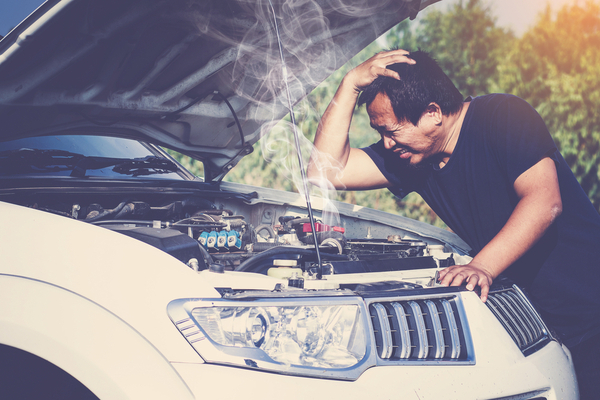
Technically, the normal temperature reading or normal engine temperature for a car is between 80-90 degrees Celsius (°C). However, this depends on the thermostat setting specified by the vehicle manufacturer.
We hope this information can assist you in dealing with sudden car temperature high situations. A car engine that is too hot can be considered an early sign of serious car damage problems.
Regular car inspections and maintenance can help you identify problems earlier, thus preventing higher car repair costs.
Additionally, if you are looking for suitable and the best additional protection for your car, visit the Qoala website for more information. Qoala is the best insurance comparison platform in Malaysia, offering easy, fast, and secure insurance purchasing processes.

 EN
EN
 MY
MY

